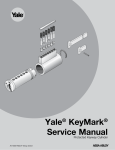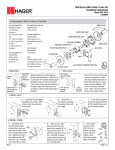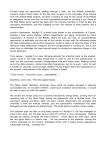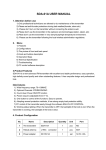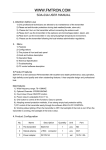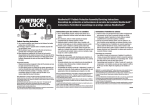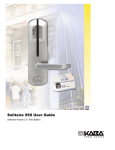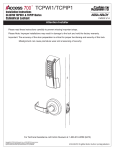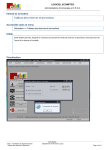Download SR6&SR9 User Manual
Transcript
SR6 & SR9 Specification Dimension -- Panels: SR6: 290(H) x 70(W) x 72 (D)-(mm) SR9: 165(H) x 70(W) x 69 (D)-(mm) SR6 & SR9 Approximate Weight:SR6: 4520 g SR9: 1850 g Electronic RFID & Keypad Door Lock Door Thickness: SR6: 45mm ~ 55mm / 56mm ~ 80mm SR9: 30mm ~ 50mm Operation Manual SR6: Standard US Mortise Lockbody SR9: Tubular latch Use 4AA Alkaline batteries (1.5V) (not included) Cards: Mifare, 13.56 MHz Distance: <= 3 cm Others: RFID Sensor Thank you for choosing scg electronic door lock. Please keep this manual for future reference. Product Overview Temperature:-10 C ~ 70 C The picture is for reference only. Please check the actual model for specific functions. Unlocking Methods 1.Mechanical Key : SR6: Horizontally position the key and turn the keyhole cover 90 Interior plate (Inside view) degrees clockwise to remove it then unlock with the key. Exterior plate (Outside view) SR9: keyhole is hidden inside the cover of the front lever. 2.Keycard : Simply place the RFID card to the sensor. Setting Button Door Lock Status Up/Right Button: Use it to add new keycards Sensor Down/Left Button: Use it to delete keycards SR6: Up = SR9: Right SR6: Down = SR9: Left Status Light Operation Successful Blue Sounds 1 beep Operation Failed Red 3 beeps Red 5 continuous beeps 1 beep Enter/ Exit Setup Mode Low Battery Keyhole Cover Battery Cover Horizontally position the key and turn the keyhole cover 90 clockwise to remove it then unlock with the key Use the special tool provided to open Push and slide up to open SR9 model Before After Door Opened Indication 1 beep after the right Keycard Door Closed Indication After depressing the lever, the door is locked 1.5 seconds after the lever comes back to the horizontal position. Types of No. Type Quantity Administrator 1 sets Add/Delete card User 99 sets Unlock the door Function Instruction The first card to be encoded Only used to unlock doors Keyhole Cover Battery Cover --Accessories-Notice .The first card to be encoded is the Administrator keycard. .Please turn to the last page to restore to the factory default settings. .There is no need to reset after battery replacement. Emergency Override Key 3 keys provided per lock (left for SR6, right for SR9) RFID Keycards RFID Keycard Setup Administrator Setup ( The first keycard to be encoded is Administrator keycard ) 2 Enter Setup Mode Administrator setup Exit Setup Mode Press the Up/Right Button on the back of the lock for 2 seconds until hear 1 beep. ( Blue light ) Place the intended keycard close to the sensor. ( 1 long beep ) Automatically exits setup mode 1 1 3 User Setup Enter Setup Mode Press the Up/Right Button on the back of the lock for 2 seconds until hear 1 beep. ( Blue light ) User Added Setup Administrator recognition 2 Place the administrator keycard to the sensor for authentication. ( 1 long beep ) 3 Simply place the intended keycards close to the sensor one by one. Exit Setup Mode 4 5 seconds after operation automatically exits setup mode ( 3 short beeps ) Delete Existing Keycards ( Administrator keycard can’t be deleted here) Enter Setup Mode 1 1 Press the Down/Left Button on the back of the lock for 2 seconds until hear 8 continuous beeps. ( Red light ) Factory Default Settings Press the Down/Left Button on the back of the lock for 2 seconds until hear 8 continuous beeps. ( Red light ) Delete Existing Card 2 2 Place the intended keycards to the sensors for deletion. ( one card at a time.) During the beeps, press the Up/Right button until hear a long beep. Others This equipment has been tested and found to comply with the limits for a Class B digital device, pursuant to part 15 of the FCC rules. These limits are designed to provide reasonable protection against harmful interference Troubleshooting in a residential installation. This equipment generates, uses and can Problem Continuous beeps for 1 minute after successful No reaction when entering Keycards Indication Low battery alert. Replace the battery immediately. Battery is dead. Please use the key to unlock. Consecutive Keycards errors. Pleae try again after 1 minute. Light doesn’t go off Replace batteries. radiate radio frequency energy and, if not installed and used in accordance with the instructions, may cause harmful interference to radio communications. However, there is no guarantee that interference will not occur in a particular installation. If this equipment does cause harmful interference to radio or television reception, which can be determined by turning the equipment off and on, the user is encouraged to try to correct the interference by one or more of the following measures: Reorient or relocate the receiving antenna. Increase the separation Important Notes 1. If a card is lost, immediate factory default setting is recommended. * Notice:The administrator (*00) can’t be deleted individually. 2. Please use alkaline batteries only. 3. To preserve the cleanliness of the product, wipe it down using a clean cloth. Do not use alcohol or other chemical agents. 4. Please handle the lock carefully to ensure normal operation. 5. If you encounter any problem, please refer to the user manual first. If you still have questions, please feel free to contact us or email us. 6. 2 beep sounds after you place the card close to the sensor show the lever is not at parallel position. Please have the lever at parallel position and try again. 7. 5 beep sounds indicate battery low status. 5 fast beep sounds indicate battery extremely low status. 10 beep sounds indicate out of battery. 8. Motor sound comes after successful batter replacement. between the equipment and receiver. Connect the equipment into an outlet on a circuit different from that to which the receiver is connected. Consult the dealer or an experienced radio/TV technician for help. This device complies with part 15 of the FCC Rules. Operation is subject to the following two conditions: (1) This device may not cause harmful interference, and (2) this device must accept any interference received, including interference that may cause undesired operation. FCC Caution: To assure continued compliance, any changes or modifications not expressly approved by the party responsible for compliance could void the user's authority to operate t his equipment. (Example - use only shielded interface cables when connecting to a computer or peripheral devices.)




